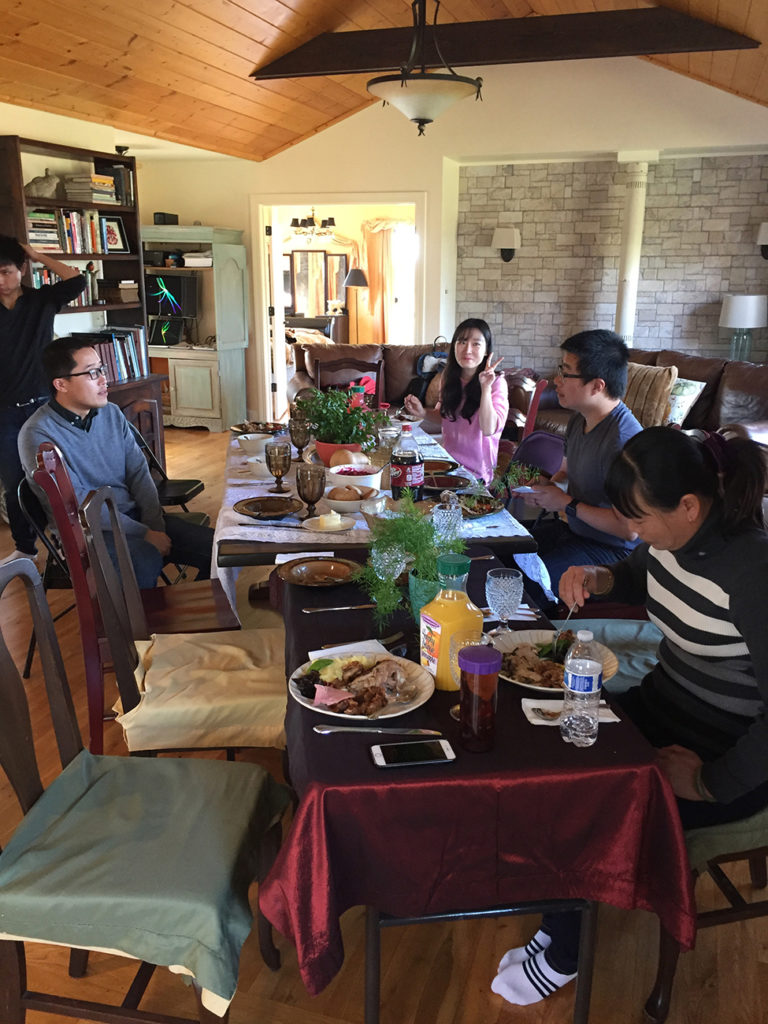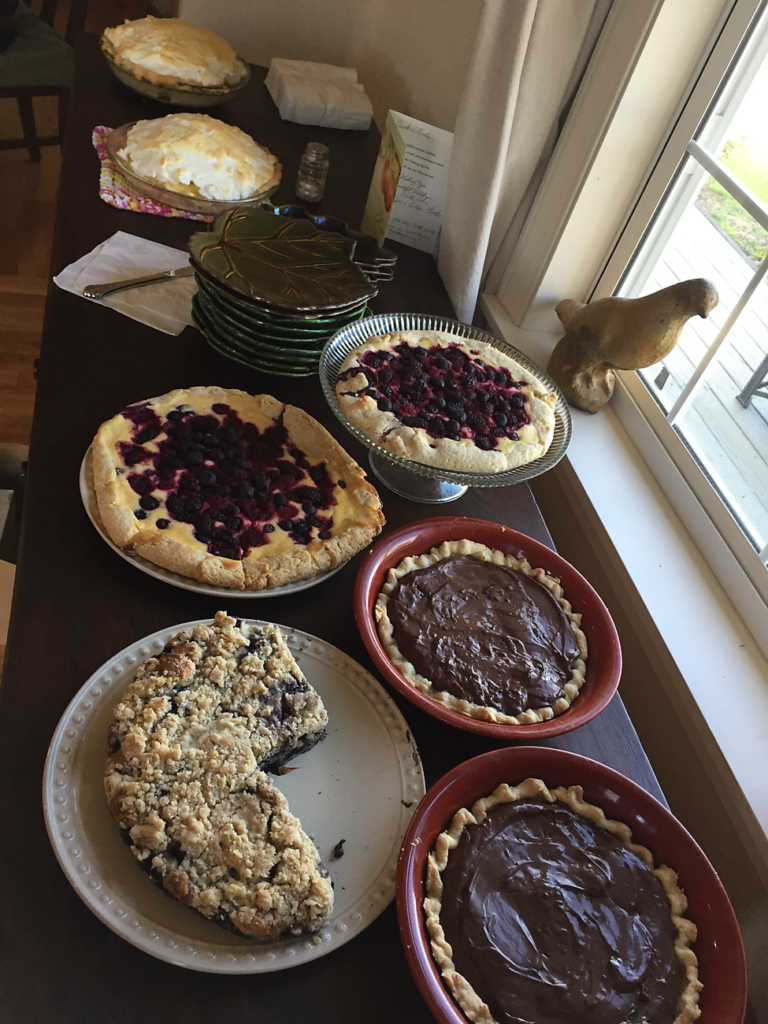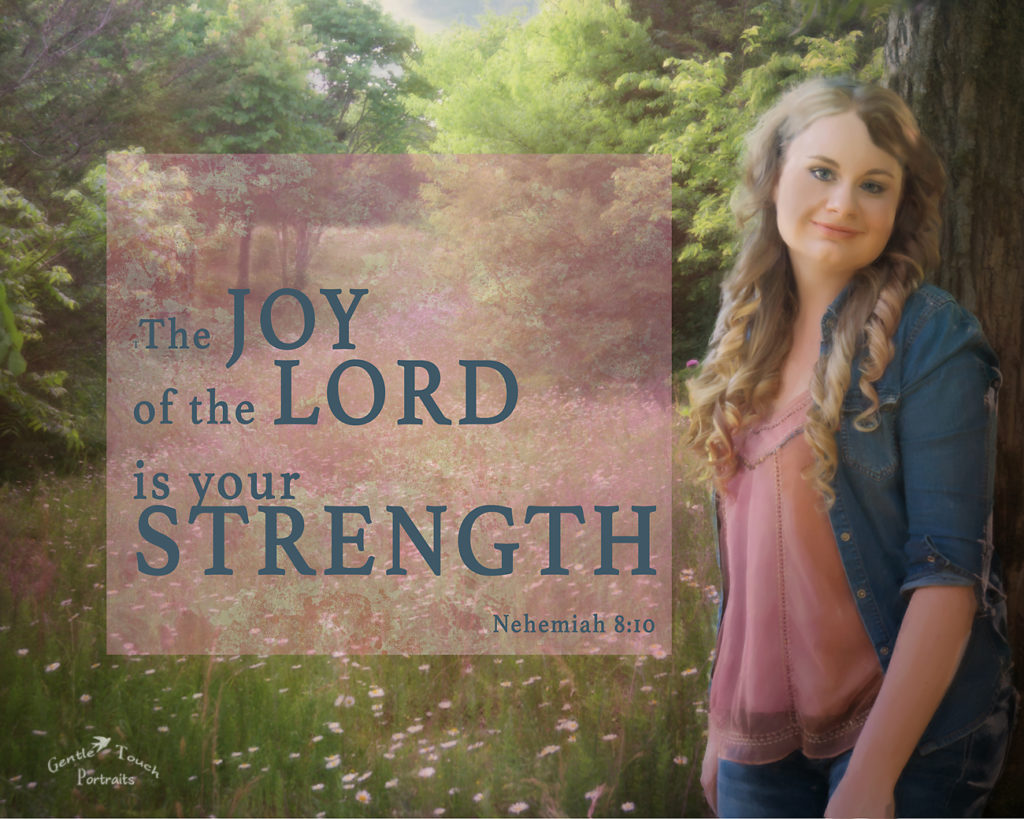 Why am I thinking about Thanksgiving and Christmas when it isn’t even summer yet?! What do the holidays have to do with my burning questions about whether God is happy and whether he’s happy with me? Some of you can identify with where I’m coming from in my hang-up with feelings of falling short. Some of us are by nature serious, introspective, and driven. This predisposes us to recognize that we’re not what we want to be. Of course we aren’t there- yet. Just like everybody else on the planet, even the ones that seem so self-assured and proud of their accomplishments and opinions, none of us have arrived. We all are looking forward to God completing in the next life what he began to do in us in this life.
Why am I thinking about Thanksgiving and Christmas when it isn’t even summer yet?! What do the holidays have to do with my burning questions about whether God is happy and whether he’s happy with me? Some of you can identify with where I’m coming from in my hang-up with feelings of falling short. Some of us are by nature serious, introspective, and driven. This predisposes us to recognize that we’re not what we want to be. Of course we aren’t there- yet. Just like everybody else on the planet, even the ones that seem so self-assured and proud of their accomplishments and opinions, none of us have arrived. We all are looking forward to God completing in the next life what he began to do in us in this life.
Getting back to Thanksgiving and Christmas. I’ve been meditating on a few chapters in the book of Nehemiah in the Old Testament. It’s a story of restoration. The nation of Israel had been overpowered and its people carried into exile because they had turned their backs on God. Nehemiah recounts how some of the people of Israel many years later returned to their land and the struggles they faced. While exiles, they couldn’t meet together for Scripture reading so they were ignorant of God’s laws. When they returned to their own land, they were anxious to learn about God, so they requested that a teacher read them God’s words. On a certain day, from early morning till noon, they listened carefully as the Law of God was read and explained. So far so good. But their response was tears! They were sad, dejected, and discouraged. They saw that they didn’t measure up and they were worried and disheartened.
Now if you are like me coming from a conservative Christian background, you’re thinking, “That’s good. They should be sad for their sins.” But surprisingly, the response of their godly leaders wasn’t to commend them for being good, serious, dejected, sad God-seekers. To my astonishment, I realized their godly leaders told them to stop crying and go home and party. I’m not making this up.
The governor, the priest, and the teachers all told the people, “This is a special day for the Lord your God. So don’t be sad and don’t cry!”
Nehemiah told the people, “Enjoy your good food and wine and share some with those who didn’t have anything to bring. Don’t be sad! This is a special day for the Lord, and he will make you happy and strong.”
The Levites encouraged the people by saying, “This is a sacred day, so don’t worry or mourn!” When the people returned to their homes, they celebrated by eating and drinking and by sharing their food with those in need, because they had understood what had been read to them. Nehemiah 8:9-12 (Contemporary English Version)
Go home and eat rich food and sweet drinks is literally what the Hebrew words say. What?! But what about repentance and being serious? Wait, that time will come. But right now the path forward isn’t being sad, beating themselves up, and being discouraged. Did you catch that little phrase, “This is a sacred day for the Lord, and he will make you happy and strong.” Literally, “gladness from God is your fortress.” Now that is something my poor little shriveled heart needs to hear over and over. The happiness that God has and gives to me is what makes me strong. Sadness weighs me down. Confessing sin and turning toward obedience is what God wants. He doesn’t intend for us to wallow in guilt afterward. Moving forward in gladness with God’s help is the path I want to be on.
After merry-making that evening, the leaders of the families met in the morning with the teachers and studied the Scriptures more in-depth. They realized that God instructed the people to have a festival every year at this time, so they made preparations. Two weeks later all the people met again and for seven days they gathered to hear God’s Word each morning. Afterward, they ate together and enjoyed each other’s company. On the eighth day of the festival, there was a solemn gathering when no one ate. They wore clothes of mourning. Only those who were God’s people were allowed to attend. No outsiders who didn’t care about God could come. (Up to this point they hadn’t noticed the difference between those who were seeking God and those who didn’t acknowledge the God of Israel.) They listened for 3 hours, then they prayed for three more hours confessing their sins and worshiping. Then their teachers prayed aloud leading in corporate prayer. This prayer outlined how great God is and what he has already done, how the people had refused to obey and yet God showed mercy and kindness, caring for them and giving them abundance, but finally being forced to discipline them. The prayer ended with a plea for help now. Following the prayer, the people made a vow to obey God. This vow was put in writing and signed by the political, religious, and family leaders.
Instead of feeling dejected and wallowing in guilt as they initially had, the people acknowledged to God what they had done wrong. Then they took steps to show God their change of heart. They separated from those who would pull them away from God. They promised to make God their priority. No more marrying those who didn’t love God. Now they would set aside time for God once a week for undistracted time to gather and learn Scriptures and worship. They would set aside some of their prosperity for supporting those who would teach them. Temple workers including singers would be provided for by these donations of the people. Those who lived far from the temple would meet weekly in their towns to be instructed by priests who were supported by the people’s donations. Even the people who lived far away would come a minimum of three times a year to the central meeting place, the temple in Jerusalem, for a week each time to offer sacrifices and celebrate feasts together in honor of God. (A portion of their sacrifices were burned up and the rest were divided between temple personnel and the person who brought the sacrifice. A portion of the meat or flour or produce or wine offered was then eaten by the family who brought it usually in the company of friends and family.) In short, they chose to give God authority over their relationships, time and money.
So what does this have to do with Thanksgiving and Christmas? I think these holidays come close to what God had in mind for his people. Celebrating, praying, gathering with friends and family, reading Scripture, eating, worshiping together, sharing with those who don’t have, making music, and being happy and strong in God. After all, celebrations are God’s idea. And we’re invited to his ultimate party!
“Don’t be grieved, for gladness from God is your defense.”
“Don’t be dejected and sad, for the joy of the Lord is your strength!” Nehemiah 8:10
“Honor and majesty surround him [God];
strength and joy fill his dwelling.” 1 Chronicles 16:27
Strength and joy, joy and strength. Happiness from God gives us strength. God gladly shares his strength and happiness with us.